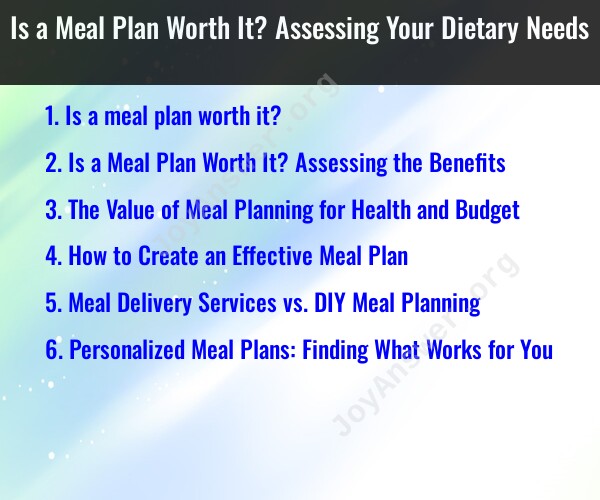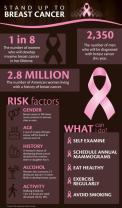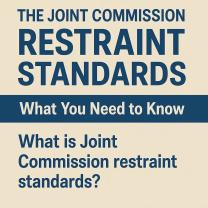Is a meal plan worth it?
Whether a meal plan is worth it depends on your individual dietary and lifestyle needs, as well as your personal preferences and circumstances. Here are some factors to consider when assessing whether a meal plan is worth it for you:
Dietary Goals: If you have specific dietary goals, such as weight loss, muscle gain, or managing a medical condition, a well-designed meal plan can help you achieve those goals more effectively. A registered dietitian or nutritionist can create a personalized plan tailored to your needs.
Convenience: Meal plans can offer convenience by saving you time and effort in meal preparation and planning. This can be especially valuable if you have a busy schedule or find it challenging to cook regularly.
Variety and Nutrition: A good meal plan can provide a balanced and diverse range of foods, ensuring you receive essential nutrients. It can also introduce you to new foods and recipes you might not have considered.
Budget: Consider your budget. Some meal plans, especially those provided by delivery services, can be expensive. Compare the cost of a meal plan to your current food expenses to determine if it's cost-effective for you.
Dietary Restrictions: If you have dietary restrictions or food allergies, a meal plan can help ensure you're getting meals that adhere to those restrictions. Be sure to choose a plan that caters to your specific needs.
Time and Cooking Skills: If you enjoy cooking and have the time and skills to prepare meals, you might find that creating your meal plan is a more suitable option. It allows you to have full control over your menu and ingredients.
Health Conditions: If you have specific health conditions, such as diabetes, heart disease, or celiac disease, a meal plan created with input from a healthcare professional can be essential for managing your condition.
Accountability: Some people benefit from the accountability that a meal plan provides. It can help you stay on track with your dietary goals and avoid impulsive or unhealthy food choices.
Support and Guidance: Meal plans from dietitians or nutritionists often come with guidance and support, which can be valuable for learning about nutrition and healthy eating.
Adaptability: Assess whether the meal plan is adaptable to changes in your life. You may need a flexible plan that can accommodate social events, travel, or other situations that disrupt your routine.
Ultimately, the worth of a meal plan depends on your specific needs, preferences, and circumstances. It's important to consider your goals, budget, and lifestyle before deciding whether a meal plan is a suitable option for you. You may also want to consult with a healthcare professional or a registered dietitian for personalized guidance.
Is a Meal Plan Worth It? Assessing the Benefits
Whether or not a meal plan is worth it depends on your individual needs and goals. However, there are many potential benefits to meal planning, including:
- Saving time: Meal planning can help you save time on grocery shopping and cooking. When you know what you're going to eat ahead of time, you can make a list of everything you need and cook in bulk on the weekends.
- Saving money: Meal planning can also help you save money on groceries. When you have a plan, you're less likely to impulse buy unhealthy or expensive foods.
- Eating healthier: Meal planning can help you eat healthier by encouraging you to choose nutritious foods and avoid unhealthy temptations.
- Reducing food waste: Meal planning can help you reduce food waste by ensuring that you use all of the food you buy.
The Value of Meal Planning for Health and Budget
Meal planning can have a significant impact on your health and budget. Here are some specific benefits:
- Health benefits: Meal planning can help you eat more fruits, vegetables, and whole grains, which are essential for good health. It can also help you reduce your intake of processed foods, sugary drinks, and unhealthy fats.
- Budget benefits: Meal planning can help you save money on groceries, which can free up your budget for other expenses. It can also help you avoid impulse buys and overspending.
How to Create an Effective Meal Plan
Here are some tips for creating an effective meal plan:
- Start by setting goals. What do you want to achieve with your meal plan? Do you want to eat healthier, save money, or reduce food waste? Once you know your goals, you can start to create a plan that will help you achieve them.
- Consider your dietary needs and preferences. Do you have any food allergies or intolerances? Are there any foods that you don't like to eat? Make sure to choose recipes that you and your family will enjoy.
- Create a weekly meal plan. This will help you stay on track and avoid making unhealthy choices during the week.
- Make a grocery list. Once you have your meal plan, make a list of all the ingredients you need. This will help you stay organized and avoid overspending at the grocery store.
- Cook in bulk. This will save you time and money. You can freeze leftovers or portion them out for individual meals.
Meal Delivery Services vs. DIY Meal Planning
Meal delivery services can be a convenient option for busy people who don't have time to cook. However, they can be expensive. DIY meal planning is more affordable, but it requires more time and effort.
Here is a table comparing meal delivery services and DIY meal planning:
| Factor | Meal delivery services | DIY meal planning |
|---|---|---|
| Convenience | Very convenient | Less convenient |
| Cost | More expensive | Less expensive |
| Time commitment | Less time commitment | More time commitment |
| Variety | Wide variety of meals available | More limited variety of meals |
Personalized Meal Plans: Finding What Works for You
There is no one-size-fits-all meal plan. The best way to find what works for you is to experiment and try different things. Here are some tips:
- Start small. Don't try to change your entire diet at once. Start by making small changes, such as adding one more fruit or vegetable to your diet each day.
- Don't be afraid to experiment. Try new recipes and foods. You may be surprised at what you like.
- Be flexible. Things don't always go according to plan. If you have a busy week, don't be afraid to order takeout or eat leftovers.
Image: Meal planning: https://www.istockphoto.com/photos/meal-planning
Conclusion
Meal planning can be a great way to save time and money, eat healthier, and reduce food waste. However, it's important to find a meal plan that works for you and your lifestyle. Experiment with different methods and recipes to find what you enjoy the most.













